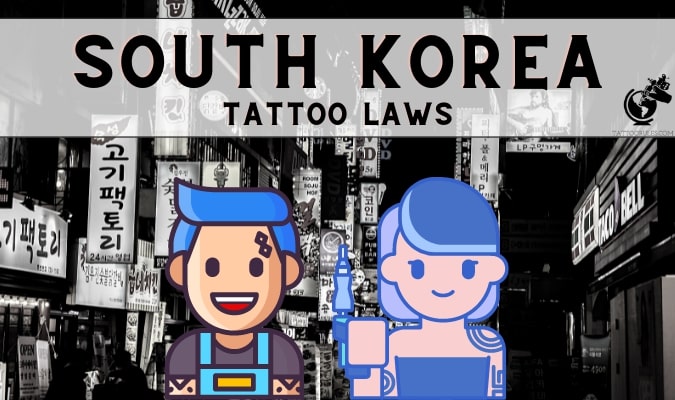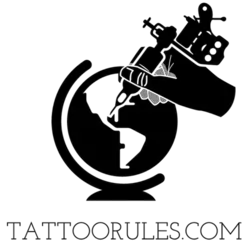There are plenty of reasons why South Korea is considered one of the most developed countries in Asia. It has a highly educated workforce, world-class infrastructure, and a thriving economy. This makes it an attractive destination for businesses and investors from all over the world.
It’s also a popular hub for tourists, thanks to its rich cultural heritage and beautiful natural scenery.
With so many Westerners visiting South Korea every year, some deciding to stay for good, more and more people become curious about what is the country’s stance on tattoos.
Looking globally, thank God, in the last decade or so we’ve been moving away from ridiculous stereotypes that see people with tattoos as thugs, gang members, or convicts.
Unfortunately, not all countries are tattoo-friendly yet and South Korea is one of these that has one of if not the most strict regulations on the subject in the world.
If you’ve been considering getting ink work done in the country, stick with us for a little while. In this article, we will look at the current tattoo regulations in South Korea to make sure you’re on the right side of the law.
South Korea Tattoo Laws & Regulations

After reading the intro, you’re probably wondering already: are tattoos in South Korea illegal?
Well, it depends on how you look at it. Similar to its neighbor Japan, the country has a long, troubled history related to tattoo regulations. At present, it has separate tattoo policies for clients and artists. Those for the second group are harsher by some distance.
Let’s look into both now.
Tattoo Laws for Customers
Like in all countries around the globe, South Korea has age requirements for people who want to get inked. You must be at least 18 years old to get tattooed and there are no exceptions to the rule. Many places around the world, such as the US, allow for the tattooing of minors as long as they can provide parental consent.
This is not the case in South Korea though so if you’re under 18, you’ll just have to wait a little longer.
What’s extremely interesting when it comes to age in South Korea, the country calculates it differently than the rest of the world. South Korea includes the time in the womb when calculating a person’s age. That means when you’re born, you’re already 1 year old. Furthermore, on New Year’s Day, everyone in South Korea receives an extra year added to their age.
All of the above means that you can in fact get a tattoo in the country at the age of 16 if you’re lucky. There’s no confirmation, however, if the age of foreigners can be calculated in the same way.
Moreover, many South Korean tattoo artists, because of the extremely strict rules (which we will discuss in a moment), refuse to tattoo minors or people who are still extremely young (pre-20). Some of them even include such info in their Instagram bios to make it clear that they’re not breaking the law.
Apart from the age limit, there are no specific tattoo laws for customers in South Korea. This means that, as long as you’re of age, you can get a tattoo without any legal consequences.
Tattoo Laws for Artists
And that’s where the “fun” part starts.
South Korea has arguably the strictest policies & regulations when it comes to the sole procedure of tattooing. And they’ve been in place for a while too – over 30 years to be precise.
Since the 1992 ruling of the Supreme Court, South Korea has been treating tattoos as a form of body modification. Because of that, the government has placed it under the Medical Act which requires all tattoo artists to have a medical license in order to operate legally.
This is easier said than done, though. In order to obtain a medical license in South Korea, you must graduate from an accredited medical school and pass a number of difficult exams. That means that nearly all of the tattoo artists operating in the country at the moment are doing so illegally.
The government has been trying to crack down on this for a while now. In 2014, they started investigating over 100 tattoo parlors around the country and find many of them. The police have also raided a number of studios, resulting in the arrest of several artists.
Despite all of that, however, the number of illegal tattoo shops in the country remains high. The main reason for that is the extremely demanding process of becoming a licensed artist and the growing popularity of tattoos amongst regular citizens.
The punishment for failing to comply is a maximum fine of 50 million won (± $40,000) and/or prison terms ranging from two years to life, depending on the situation.
What if you have a medical license?
In the rare case when a tattoo artist is indeed a licensed medical professional, there are still some extra regulations to adhere to. For example, it’s illegal to tattoo from homes or any type of non-licensed facility. All tattoo parlors are subject to regular health inspections and must follow specific sanitary rules, which means:
- all needles must be sterilized before each use
- tattoo machines must be properly disinfected
- the workspace must be spotless
- only disposable gloves can be used
- single-use razors only
A tattoo artist in South Korea is entitled to refuse to do the work if:
- he finds the client too young
- he finds the client rude
- he has suspicion the client is under the influence of drugs or alcohol
- the tattoo design goes against his moral compass (eg. it’s racist)
- he’s uncomfortable tattooing a particular body part
South Korea’s Tattoo Ban: the Background
South Korea’s current extremely strict stance on tattoos is ridiculous but it’s not new. It’s a result of centuries of negative associations and a general lack of understanding when it comes to this type of body art.
Koryŏ Dynasty
Tattoos first started appearing in the country during the Koryŏ Dynasty (935 – 1392). During that period, they had mostly positive connotations and were often used as a form of magic charm that would protect fishermen and divers from mythological sea monsters.
Chosŏn Dynasty
During the Chosŏn Dynasty (1392 – 1910), however, that all changed. The new rulers – who were Confucians – looked down on tattoos and started associating them with criminals and the lower classes.
Tattoos describing their misdeeds would be etched onto the skin of offenders in exposed areas where they might be seen by others.
As a result, the general perception of tattoos in society shifted and they became seen as something shameful and disgraceful.
Gang Association
When tattoos in Korea started to be associated with gangs and became a common practice, the criticism grew even greater in the 20th century.
During Japan’s colonial reign over Korea (1910-1945), this was an imitation of Japanese gang culture. This made tattoos even less appealing, which was already a trait of the Korean Natives’ Confucian culture.
That attitude has, by the sounds of it, persisted until today.
Since the 1992 ruling, tattoo artists from around the country have been fighting for the legalization of their profession. Their latest attempt to make the government change the law failed once again in March 2022 when Constitutional Court rejected their appeal, claiming that the current ban is “justified and necessary.”
Tattoo Laws in South Korea: FAQ
Now that you know everything you need to about South Korean tattoo laws, below find some frequently asked questions on the subject.
-
Can the military get tattoos in Korea?
No, the military is the only profession in South Korea that does not allow people with tattoos to serve. This is because the country’s laws consider tattoos as a form of body modification, which is not allowed in the military.
You can get the tattoo after your service is over.
-
Is getting a tattoo in Korea risky?
No – the only person that is taking the risk is the artist, not the customer. When it comes to the quality of tattoos, South Korea is home to thousands of extremely talented artists that can do the job brilliantly.
-
What about tattoo removal in Korea?
Tattoo removal is legal and there are a few medical facilities that offer this service. The price is usually around $200-300 per session, depending on the size and color of the tattoo.
-
Does North Korea have similar tattoo laws?
There is no information available on North Korea’s stance on tattoos. It is possible that the country has similar laws, but this cannot be confirmed.


